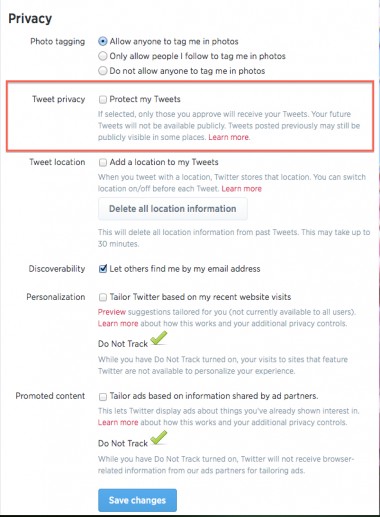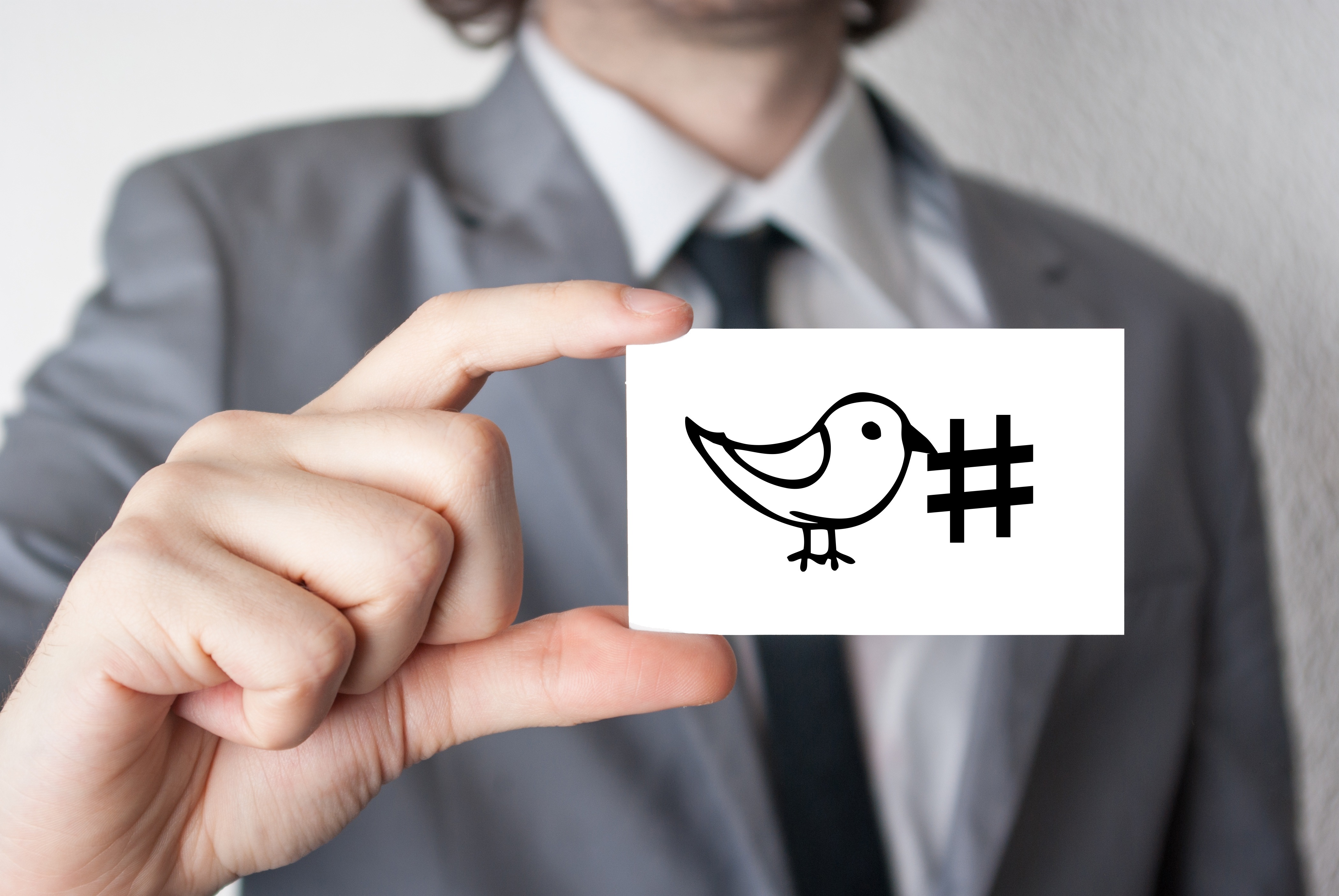Twitter has been a happening place this spring. Reuters suggests the micr0blogging site will have nearly 400 million users by 2018. In addition, the hashtag #YesAllWomen exploded, and according to CNN, it was mentioned in 1 million tweets in just one week. That’s a lot of talking.
At the same time, there’s a ghost conversation going on about the public nature of Twitter. Specifically, some people who thought they were speaking at least semi-privately have discovered that their names, their identities, and in some cases, their locations were being spread all across the internet after they shared a few thoughts that seemed somehow newsworthy.
Seems like it’s time to look a little closer at how Twitter really works, and how much privacy a reasonable person can expect while using this particular social media site.
 Screen shot taken May 30, 2014.
Screen shot taken May 30, 2014.Privacy Options: Public or Protected?
Twitter offers two basic settings: public and protected. Those who have a public account share their thoughts with everyone, with no real control over who sees what. If you Tweet something, anyone can see it. A study from the PewResearch Internet Project suggests that about 64 percent of teens who use Twitter have public accounts, and I would guess that the same stat would hold true for adults. Why? Because protected accounts are a pain in the neck.
A protected account is basically blocked from public view. It’s an invitation-only gig; thoughts shared on a protected Twitter account can only be seen and retweeted by Twitter users that have been approved as followers by the account owners. Private accounts seem to fly in the face of what Twitter is all about, as they don’t really let you share your thoughts openly.
Use in Reporting
Since so many people do have open, public accounts, it’s not surprising that reporters would be tempted to share the words they see on Twitter. If I was a reporter, for example, and I was pulling together a piece about women in the workforce, I would be sorely tempted to pull in a few Tweets from the #YesAllWomen conversation to back up my points.
Technically, I could do that. As a snarky piece on Gawker so aptly points out, “Twitter is Public,” which means that I can expect no privacy when I’m sharing my thoughts on Twitter. Even though researchers suggest that identification data should be removed from all tweets that end up in something like a report or a news article, many professionals could glide right over those rules and re-post my public words. It’s done all the time.
What’s the Risk?
Unfortunately, when semi-private Tweets become very public fodder, a number of very serious problems can take hold. I’ll hit that CNN story story up again here. In this particular article about the infamous women hashtag, the authors include several screen shots of Tweets written by real women who dealt with some form of bigotry. In at least one of these screen shots, the woman complains that she’s facing backlash from other Twitter users, due to the words she shared. I wonder how many more attacks she’ll have now that her name, face, and Twitter handle have been published on CNN.
I saw more than my share of comments this week that I think might have been best left unsaid. I won’t reproduce them via screenshot, for privacy reasons, but I saw more than a few notes that suggested some sort of violent act. In one instance, I saw a comment from a reader who suggested that he’d use Twitter as an employment screening tool: Anyone who said anything offensive on Twitter would be blocked from working at his company.
And here’s where my hackles go up.
To Tweet Publicly or Privately
It’s easy to get drawn into a debate on Twitter. In fact, the medium seems to demand it. Conversations are fast and furious, with notes coming from people who are both familiar and unfamiliar, close and far away. A simple little note can blow up into a three-headed monster of jibber jabber, and sometimes, things get a little heated. Conversations begin to move from the subtle to the hostile, and all of that talk unfolds in a public space.
Twitter does an excellent job of protecting information from government intrusion. In fact, the Electronic Frontier Foundation suggests that Twitter holds a five-star rating in terms of protecting information from governmental intrusion. But, Twitter can’t protect people from themselves. And at the moment, it’s possible that people are sharing just a little too much information on this microblogging site.
In general, it’s best to use Twitter to discuss business-related topics, like:
- New products
- Openings
- New blog posts
- Employment opportunities
- Industry news
Personal, private conversations, however, should be on personal, blocked channels. Twitter allows consumers to hold multiple accounts, so there’s no reason not to keep inflammatory data behind a firewall. That way, comments won’t spread across the web in news articles, and they won’t be subject to search by random strangers. Sure, the comments might have a smaller reach, but they might not tend to shine a spotlight where it might not be warranted.
Do you have a protected Twitter account? I’d love to hear about it in the comments section.
Image credit: Shutterstock.com. Used under license.





![AI Overviews: We Reverse-Engineered Them So You Don't Have To [+ What You Need To Do Next]](https://www.searchenginejournal.com/wp-content/uploads/2025/04/sidebar1x-455.png)